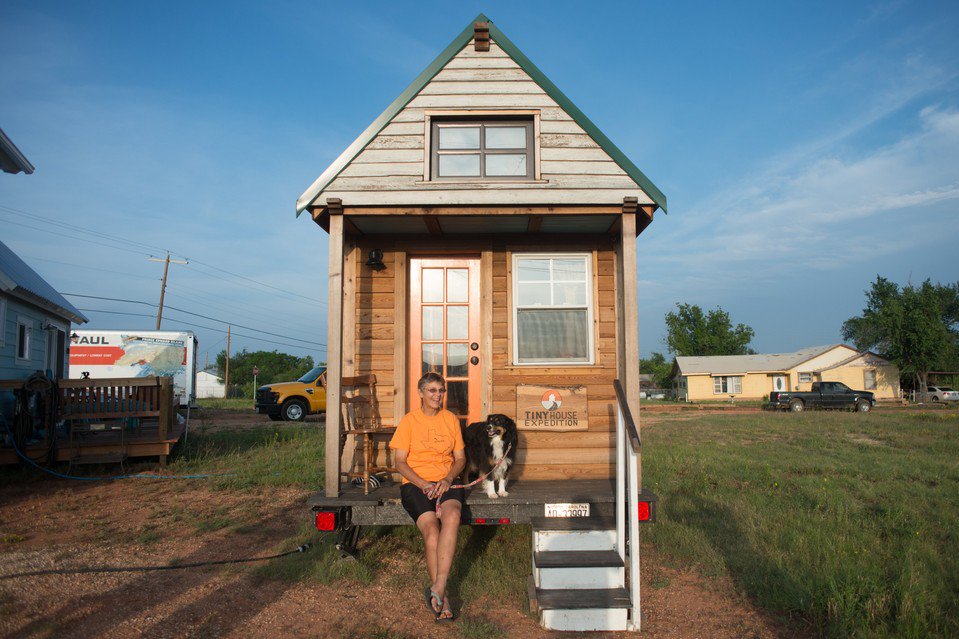| Topic: “America’s First ‘Tiny’ House Friendly Town.” | |
|---|---|
|
'No anarchists or nudists’ welcome at Texas ‘Tiny House’ community

Hard-boiled Texans in the tiny city of Spur have begun to re-think their initial embrace of the Tiny House movement since too many “anarchists and nudists” started moving to the town. Two years ago, residents signed a proclamation declaring Spur to be “America’s first ‘tiny’ house friendly town.” Nearly all building restrictions were removed in the hope of reversing a population decline and attracting “eco-conscious, do-it-yourself builders who like to live in very small houses,” reported the Wall Street Journal. Dickens County commissioner Charlie Morris said the recent influx of new inhabitants has brought residents that are “educated, professional, and seem like they really have something to bring to the community,” but then added, “What we don’t want are anarchists or nudists.” Charles Richter, developer of the Richter scale, was an avid nudist. So was Benjamin Franklin. — Weird History (@weird_hist) May 21, 2015 Updated restrictions were introduced in March to block the construction of dwellings that might be found in Black Rock City during Burning Man. The town’s loose building codes, low prices, and ultra-high-speed fiber internet have allowed residents to work from home rather than farm for a living. The new restrictions specify that all tiny houses have to be connected to the power grid, water supply, and sewer system – and they can’t be on wheels. “I was very forthcoming about what I wanted to build, and they said it was fine – and then they didn’t,” Benjamin Garcia told WSJ in describing his scuttled plans to build a home from earth in Spur. Garcia decided not to fight the restrictions, but found a work around by teaming up with two others and purchasing a 15-acre plot four miles from Spur, just outside the jurisdiction of the building restrictions. Most tiny houses in Spur have an area of around 300 square feet, about one-third the size of a swimming pool, although the classification can apply to dwellings with areas of up to 900 square feet. The tiny house movement emerged out of a desire to find affordable housing and live in more eco-friendly dwellings. Such communities already exist in nudist/anarchist-friendly cities such as Austin, Portland, and Washington, with more planned in San Francisco and Madison, Wisconsin. 
http://www.rt.com/usa/346683-spur-texas-tiny-houses/ |
|
|
|
|
|
Edited by
Conrad_73
on
Wed 06/15/16 08:44 AM
|
|
|
guess HUD will be on their case presently!
http://timbertrails.tv/Government-HUD-Rule-Could-Prohibit-Use-of-Tiny-House-as-Dwelling-Domicile-Primary-Residence http://returntonow.net/2016/04/02/living-in-tiny-homes-or-rvs-could-soon-be-illegal/ HUD Wants to Outlaw Living in RVs and Tiny Homes April 2, 2016 at 5:18 am The U.S. Department of Housing and Urban Development – which ironically was founded to end poverty and racial injustice in housing – proposed a law last month that would make living in a recreational vehicle – and potentially a tiny home – illegal. |
|
|
|
|
|
Hard-boiled Texans in the tiny city of Spur ....

|
|
|
|
|
|
guess HUD will be on their case presently! http://timbertrails.tv/Government-HUD-Rule-Could-Prohibit-Use-of-Tiny-House-as-Dwelling-Domicile-Primary-Residence http://returntonow.net/2016/04/02/living-in-tiny-homes-or-rvs-could-soon-be-illegal/ HUD Wants to Outlaw Living in RVs and Tiny Homes April 2, 2016 at 5:18 am The U.S. Department of Housing and Urban Development – which ironically was founded to end poverty and racial injustice in housing – proposed a law last month that would make living in a recreational vehicle – and potentially a tiny home – illegal. You read my mind. When I first read about this little community, my first thought was WHO will be screaming " You can't live like that! Live like this... Blah blah blah " 
|
|
|
|
|
|
Edited by
IgorFrankensteen
on
Wed 06/15/16 12:35 PM
|
|
|
Actually, it's not at all clear that that is what this proposed rule change does.
Here's the actual text of the proposed change: This rulemaking proposes to revise the exemption for recreational vehicles that are not self-propelled from HUD's Manufactured Housing Procedural and Enforcement Regulations. This proposed rule is based on a recommendation adopted by the Manufactured Housing Consensus Committee (MHCC) which would define a recreational vehicle as one built on a vehicular structure, not certified as a manufactured home, designed only for recreational use and not as a primary residence or for permanent occupancy, and built and certified in accordance with either the National Fire Protection Association (NFPA) 1192-15 or American National Standards Institute (ANSI) A119.5-09 consensus standards for recreational vehicles. HUD is adopting the MHCC's recommendation but modifying it to require certification with the updated ANSI standard, A119.5-15, and by including a requirement that units claiming the ANSI A119.5-15 exemption prominently display a notice stating that the unit is designed only for recreational use, and not as a primary residence or permanent dwelling.
As usual, it's not written in plain English, it's written in typical governmental half-speak, with so many unexplained cross-references and double negatives, that it's damn hard to say what it's saying yes to, and what it's saying no to. The most important phrase looks to be this one: HUD is adopting the MHCC's recommendation but modifying it to require certification with the updated ANSI standard, A119.5-15, and by including a requirement that units claiming the ANSI A119.5-15 exemption prominently display a notice stating that the unit is designed only for recreational use, and not as a primary residence or permanent dwelling.
Now, double check for yourselves, but that doesn't look as though anyone is "outlawing tiny houses," they are requiring that anyone who manufactures a recreational vehicle, and wants it to get whatever exemptions are associated with NON-PERMANENT RESIDENCES, must clearly label said exempted vehicle, so that it's clear to those buying them, that they are NOT designed as legal for permanent habitation. So actually, it's not a prohibition of anything whatsoever. It's a labeling requirement. In short, if someone wants to sell you a tiny house on wheels, they have to tell you the truth, and let you know in advance, whether or not you CAN choose to live full time in it. It's consumer protection. |
|
|
|
|
|
Edited by
Conrad_73
on
Wed 06/15/16 01:27 PM
|
|
|
Actually, it's not at all clear that that is what this proposed rule change does. Here's the actual text of the proposed change: This rulemaking proposes to revise the exemption for recreational vehicles that are not self-propelled from HUD's Manufactured Housing Procedural and Enforcement Regulations. This proposed rule is based on a recommendation adopted by the Manufactured Housing Consensus Committee (MHCC) which would define a recreational vehicle as one built on a vehicular structure, not certified as a manufactured home, designed only for recreational use and not as a primary residence or for permanent occupancy, and built and certified in accordance with either the National Fire Protection Association (NFPA) 1192-15 or American National Standards Institute (ANSI) A119.5-09 consensus standards for recreational vehicles. HUD is adopting the MHCC's recommendation but modifying it to require certification with the updated ANSI standard, A119.5-15, and by including a requirement that units claiming the ANSI A119.5-15 exemption prominently display a notice stating that the unit is designed only for recreational use, and not as a primary residence or permanent dwelling.
As usual, it's not written in plain English, it's written in typical governmental half-speak, with so many unexplained cross-references and double negatives, that it's damn hard to say what it's saying yes to, and what it's saying no to. The most important phrase looks to be this one: HUD is adopting the MHCC's recommendation but modifying it to require certification with the updated ANSI standard, A119.5-15, and by including a requirement that units claiming the ANSI A119.5-15 exemption prominently display a notice stating that the unit is designed only for recreational use, and not as a primary residence or permanent dwelling.
Now, double check for yourselves, but that doesn't look as though anyone is "outlawing tiny houses," they are requiring that anyone who manufactures a recreational vehicle, and wants it to get whatever exemptions are associated with NON-PERMANENT RESIDENCES, must clearly label said exempted vehicle, so that it's clear to those buying them, that they are NOT designed as legal for permanent habitation. So actually, it's not a prohibition of anything whatsoever. It's a labeling requirement. In short, if someone wants to sell you a tiny house on wheels, they have to tell you the truth, and let you know in advance, whether or not you CAN choose to live full time in it. It's consumer protection. yep,CONSUMER PROTECTION! Sure glad Government is so concerned about the Consumer! In your Eyes,Government can do no wrong,hmm? |
|
|
|
|
|
|
|
 Had a deer camp once similar to that....good times. Had a deer camp once similar to that....good times.
|
|
|
|
|
|
Actually, it's not at all clear that that is what this proposed rule change does. Here's the actual text of the proposed change: This rulemaking proposes to revise the exemption for recreational vehicles that are not self-propelled from HUD's Manufactured Housing Procedural and Enforcement Regulations. This proposed rule is based on a recommendation adopted by the Manufactured Housing Consensus Committee (MHCC) which would define a recreational vehicle as one built on a vehicular structure, not certified as a manufactured home, designed only for recreational use and not as a primary residence or for permanent occupancy, and built and certified in accordance with either the National Fire Protection Association (NFPA) 1192-15 or American National Standards Institute (ANSI) A119.5-09 consensus standards for recreational vehicles. HUD is adopting the MHCC's recommendation but modifying it to require certification with the updated ANSI standard, A119.5-15, and by including a requirement that units claiming the ANSI A119.5-15 exemption prominently display a notice stating that the unit is designed only for recreational use, and not as a primary residence or permanent dwelling.
As usual, it's not written in plain English, it's written in typical governmental half-speak, with so many unexplained cross-references and double negatives, that it's damn hard to say what it's saying yes to, and what it's saying no to. The most important phrase looks to be this one: HUD is adopting the MHCC's recommendation but modifying it to require certification with the updated ANSI standard, A119.5-15, and by including a requirement that units claiming the ANSI A119.5-15 exemption prominently display a notice stating that the unit is designed only for recreational use, and not as a primary residence or permanent dwelling.
Now, double check for yourselves, but that doesn't look as though anyone is "outlawing tiny houses," they are requiring that anyone who manufactures a recreational vehicle, and wants it to get whatever exemptions are associated with NON-PERMANENT RESIDENCES, must clearly label said exempted vehicle, so that it's clear to those buying them, that they are NOT designed as legal for permanent habitation. So actually, it's not a prohibition of anything whatsoever. It's a labeling requirement. In short, if someone wants to sell you a tiny house on wheels, they have to tell you the truth, and let you know in advance, whether or not you CAN choose to live full time in it. It's consumer protection. yep,CONSUMER PROTECTION! Sure glad Government is so concerned about the Consumer! In your Eyes,Government can do no wrong,hmm? [/quote Yet another false assumption/fantasy of yours. Still can't read. |
|
|
|
|
|
I started watching "Tiny House Nation" a year or more ago . Partly because for more than 20yrs I built and roofed houses on golf course/country clubs .
Now there are several small towns around me that have houses below 1k sq ' that are quite modest and quaint. So I began to question what my actual my liveing requirements are . My 1'600sq' house: I only use less than 600sq' . So l fail to see where 900sq' would be concidererd small . Get off your egos !! 
|
|
|
|
|
|
I started watching "Tiny House Nation" a year or more ago . Partly because for more than 20yrs I built and roofed houses on golf course/country clubs . Now there are several small towns around me that have houses below 1k sq ' that are quite modest and quaint. So I began to question what my actual my liveing requirements are . My 1'600sq' house: I only use less than 600sq' . So l fail to see where 900sq' would be concidererd small . Get off your egos !! 
Hhaa . give em hell 
|
|
|
|
|
|
I started watching "Tiny House Nation" a year or more ago . Partly because for more than 20yrs I built and roofed houses on golf course/country clubs . Now there are several small towns around me that have houses below 1k sq ' that are quite modest and quaint. So I began to question what my actual my liveing requirements are . My 1'600sq' house: I only use less than 600sq' . So l fail to see where 900sq' would be concidererd small . Get off your egos !! 
I agree. I don't think it's ego driving most people though. I bought more house than I needed, for reasons of providing a fall-back position for my children, and because I want to at least OCCASIONALLY play music way too loud. But when I was a kid, I spent a lot of time trying to design a VERY small living space. I had it down to a single room, with shared toilet facilities. I read a while back, that in some of Japan's larger cities, that the cost of hotel space is so high, that there is a market for something like secure sleep "pods." Something only slightly larger than a coffin, that the person enters feet first, just to sleep with security. Now THAT'S tiny. |
|
|
|
|










